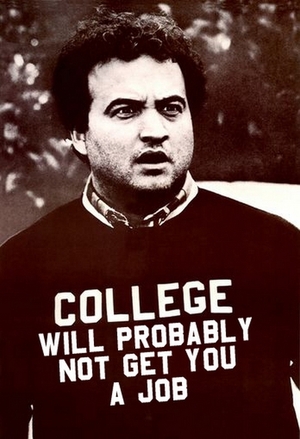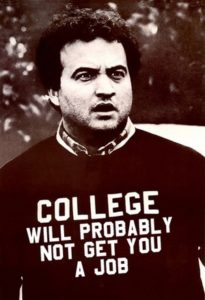
28 May Who Needs College? Maybe Not Everyone
We all know the stories. Zuckerberg, Gates, Jobs, Dell, all geniuses who dropped out of college and become happy billionaires (but are they really happy?). What did they miss? Something important? Would more courses in philosophy or anthropology or psychology have improved their ability to succeed? Is that even the point? The debate has been raging for several years about the value of college given that its cost has skyrocketed dramatically faster than the overall cost of living in the last few decades for no reason that any college administrator I know can explain. And after all that cost many kids are left jobless and debt-ridden.
So getting right to it: not everyone needs college to succeed. On the high end, the genius types above who maybe could teach more than they’d learn by having stayed in. And maybe on the low end, folks who are likely to end up in blue collar jobs that will pay the bills and require skills they can develop and learn while working. Everyone in between? Well that’s the question. Some do need academic training: if you are entering a licensed profession such as medicine, teaching or law, the foundations you learn in school are a basic prerequisite. But do you need it for success in the business world, or in the arts or otherwise?
Some say you need a chance to grow up. That college lets you explore options. Could you do all that while paying your dues or an old-fashioned apprenticeship in a corporate job? Maybe. Can anyone be sure of their direction at age 17? Yes, some can. And some can’t. And directions can change whether or not you go to school. I say: if college provides you useful knowledge, such as one receives in an undergraduate business program, then it can be worthwhile. The humanities help round you very nicely and are valuable intrinsically, but can you pursue them on your own without an$80,000 per year education? Probably so. College professors provide helpful insights and experience beyond the textbooks, but there is not an unlimited value to that. And with free no-credit online courses proliferating, even that will be more available cost-effectively.
The other choice: let’s make college truly affordable for those in the middle without just taxing everyone to pay for it. How? No clue. So assuming that’s unlikely, if the business world could develop a way to assess people’s capabilities and talents without a college education and remove their bias to require it, maybe things could change and kids can have choices without feeling bound to college. Just saying.



No Comments